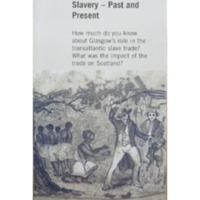
Towards Understanding Slavery: Past and Present
The Towards Understanding Slavery: Past and Present initiative by Glasgow City Council aimed to increase understanding of the human effects of the transatlantic slave trade, and explore its impact on Scotland's national heritage and Glasgow's history. A series of events, exhibitions and education programmes ran across the city throughout 2007. These included an exhibition of William Blake's works relating to the idea of slavery at the Burrell Collection, and a photographic exhibition by Graham Fagen, 'Downpresserer', at the Gallery of Modern Art, examining the cultural heritages of Scotland and Jamaica. There was a series of performances and talks at Kelvingrove Art Gallery and Museum, and events at the People's Palace and Winter Gardens focused on links between Glasgow's tobacco trade and slavery through the family portrait of the 'tobacco lord' John Glassford (there is said to be a figure of a young black man behind Glassford's chair that has been deliberately obscured or painted over). A year-long programme of lectures, schools events and exhibition highlighting the life of African communities in Glasgow took place at St Mungo Museum of Religious Life and Art.
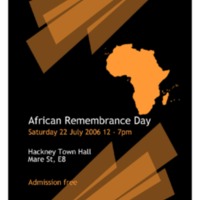
The Ligali organisation, 2007
Ligali is a Pan-African human rights organisation that challenges the misrepresentation of African people, culture and history in the British media. It produced various responses to promote the African perspective of the 2007 bicentenary, including their 'Declaration of Protest to the 2007 Commemoration' expressing dissatisfaction with much of the terminology and focus of the 'official' commemorations. Their particular focus was on the ‘Maafa’, derived from the Kiswahili word meaning ‘great disaster’, and referring to the ongoing impact of enslavement and colonialism for African peoples. The publication ‘Addressing Maafa denial and slavery apologists’ was a guide to promoting the truth about the Maafa from an Africentric position.
‘Maafa: Truth 2007’ is a documentary film directed by the Ligali founder, Toyin Agbetu, and produced by Ligali’s then head of media affairs, emma pierre. The film confronts some of the myths about British slavery, featuring contributions from community activists, project workers, teachers and the African British business community. The film was screened at various events, including African Remembrance Day at Hackney Town Hall in 2006. Ligali’s ‘Freedom Fighter’ stamps were designed by Emma Pierre-Joseph as a response to the Royal Mail’s publication of six stamps to mark the bicentenary. ‘The Walk’ is a documentary record of Toyin Agbetu’s protests at the service at Westminster Abbey to mark the bicentenary on 27 March 2007.
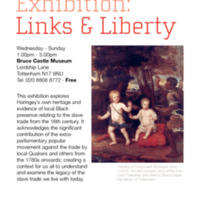
Links and Liberty
An exhibition at Bruce Castle Museum (in partnership with Euroart Studios) explored the transatlantic slave trade, Haringey's heritage relating to the trade and its legacy, and the historic Black presence in the borough from the 16th century onwards. There was a particular focus on the painting of Lucius and Montague Hare, sons of Lord Coleraine (former owner of Bruce Castle), with their African servant. The exhibition also looked at the extra-parliamentary popular movement against the trade by local Quakers such as Priscilla Wakefield and others. Contemporary dance workshops for secondary schools were led by dance company Movement Angol.
The Links and Liberty exhibition included 'Stolen', a life-size installation by artists at Euroart Studios (John Fowler, Lorraine Clarke and Nigel Young) of a section of a slave ship. School pupils were encouraged to climb inside to imagine conditions on board.
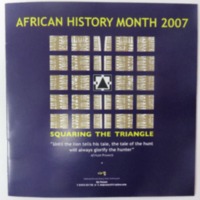
African History Month 2007: Squaring the Triangle
Squaring the Triangle was the theme of African History Month 2007 in Suffolk. The programme was co-ordinated by the Nia Project (a cultural, arts and heritage project) and explored the history and legacy of slavery through film, literature, exhibition, music and debate. The theme of Squaring the Triangle was underpinned by the African proverb, ‘Until the Lion tells his tale the tale of the hunt will always glorify the hunter’. Highlights included the Nia Memorial Lecture, given by the producer-director Pam Solomon-Fraser. Nubian Films short season looked at the current legacy of slavery and the Diaspora of African peoples. Talks, workshops and debates covered issues such as reparations, retribution, resistance, and educational guidelines for parents on how to discuss the African slave trade with children. Special recognition was given in the programme to Ghana’s 50th anniversary as an independent state. There were heritage walks around Ipswich to uncover some of the cultural connections with Africa, the Caribbean and Suffolk. A Youth Day Conference hosted by the Zimbabwe Youth brought together young people from the community to use music and poetry to explore their ideas on the legacy of the slave trade. Historian Maureen James and representatives from Suffolk County Council led pupils from local schools in researching the anti-slavery movements, with particular reference to the Clarkson family.
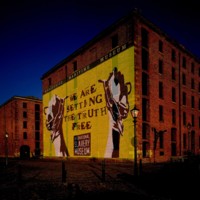
Opening of International Slavery Museum
Liverpool is a port city with a long association with transatlantic slavery. Located on Liverpool's Albert Dock, National Museums Liverpool opened the new International Slavery Museum in 2007, the first stage of a two-part development. The museum aims to promote the understanding of slavery and the transatlantic slave trade and the permanent impact the system has had on Africa, South America, the USA, the Caribbean and Western Europe. It features displays about West African society, the transatlantic slave trade and plantation life, but also addresses issues of freedom, identity, human rights, reparations, racial discrimination and cultural change. The museum also has strong ties with Liverpool’s large Black community. The museum opened on 23 August 2007, designated by UNESCO as Slavery Remembrance Day.
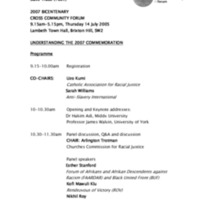
2007 Bicentenary Cross-Community Forum
The main aim of the 2007 Bicentenary Cross-Community Forum (2007BCCF) was to facilitate space for dialogue and alliance building in areas of work connected to the legacies of enslavement, related global injustices today and contemporary forms of slavery. The forum was jointly convened by Rendezvous of Victory, Anti-Slavery International and the World Development Movement. The education initiative aimed to assist in discussion and alliance-building on issues arising from the legacies of African Enslavement such as Maangamizi (Afrikan Holocaust) Awareness, Afriphobia, reparations, global injustices today and contemporary forms of enslavement. Open meetings were held in London between 2005 and 2007, and the group produced the 2007 Cross-community e-bulletin three times a year, including comment pieces about the significance of 2007. Task Action Groups were set up, such as the Cross-Community Dialogue Action Group on Education (CCODAGE), jointly hosted by the Council for Education in World Citizenship and the School of Education at Kingston University. A Global Justice Forum was developed out of the 2007BCCF in order to advance work beyond 2007.